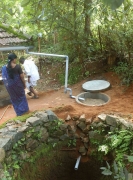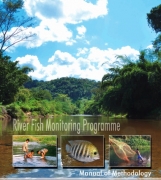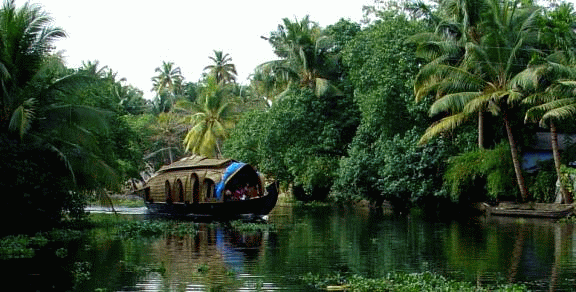/regions/kerala
Kerala
Field experiences by Avinash Krishnamurthy, BIOME Solutions
Posted on 29 Sep, 2010 11:04 AMOne of the oldest "People's electricity" systems I have ever seen (Please read the notes for each of the videos). Of course this trip had even better high points - wine made from Gooseberry and Nutmeg - all locally brewed. So travelling in the midst of hills, sipping local wine, seeing some great work, (and providing perspectives for someone-else to write - is this work or what?
Appeal to save Ramsar site - Kol wetland, Kerala
Posted on 17 Aug, 2010 03:28 PMAmayam island in Kololambu, Edappal panchayath, Malappuram ditstrict, Kerala state which have rich in biodiversity and 40 acres of kol wet land is around the island is also rich in its rare biodiversity. This kol wet land is a part of vembanad backwaters (13,632 hectors) and declared as RAMSAR SITE (No. 1214) in 2002.
Investigation of the capability of Artificial Neural Network technique for estimating evapotranspiration from minimum weather data of Tavanur, Kerala – A research report by National Institute of Hydrology
Posted on 28 Jul, 2010 07:50 PMThe study attempted to estimate the actual crop evapotranspiration from minimum weather data of Tavanur, Kerala and resulted in an Artificial Neural Network (ANN) model, which makes use of average temperature data to estimate the actual evapotranspiration. The effectiveness of this model was evaluated using various statistical indices. The results of this model were compared with various existing techniques. The analysis led to the conclusion that the ANN models were performing better than all existing techniques for computing the actual evapotranspiration. However, the study was based on a single season lysimeter data and more research work may be required to reinforce this conclusion.
Modeling of Cochin estuary using two dimensional finite element model – A research report by National Institute of Hydrology
Posted on 27 Jul, 2010 08:07 PMThe report deals with the modeling of the Cochin estuary along Kerala coast using two- dimensional finite element model. The basic equations for modeling of any surface water problems are the three dimensional hydrodynamic equations arising from consideration of mass and momentum conservation. In vertically well mixed shallow water bodies, the horizontal components of flow quantities are normally much more significant than vertical components.
Seeds of hope - Case studies from the Planning Commission and Lokayan
Posted on 12 Jul, 2010 03:33 AMThis set of case studies is part of a book prepared by Lokayan in collaboration with the Planning Commission titled “Seeds of Hope", covers themes of agricultur
Mazhapolima Participatory Well Recharge Programme - Concept Note and Process Document (2009)
Posted on 07 Jun, 2010 07:27 PM Mazhapolima is a community based well recharge programme, initiated by the Thrissur District Administration in collaboration with the Panchayat Raj Institutions in the District, and implemented by networking NGOs/CBOs, households, departments and agencies, research institutions, private sector and all other key stakeholders, who are either a water user or a water provider/planner.
Mazhapolima is a community based well recharge programme, initiated by the Thrissur District Administration in collaboration with the Panchayat Raj Institutions in the District, and implemented by networking NGOs/CBOs, households, departments and agencies, research institutions, private sector and all other key stakeholders, who are either a water user or a water provider/planner.
Diversity of approaches and implementation arrangements according to location specific needs centered on sustainable outcome and service levels are the underlying tenets of the programme. The programme envisages recharging of about 4.5 lakh open wells in the district to ensure sustainable access to water.
River Fish Monitoring Programme - Manual of Methodology by Kerala State Biodiversity Board
Posted on 07 Jun, 2010 03:33 PM Measurement of riverine biota, particularly benthic macroinvertebrates (such as crustaceans and aquatic insects) and fish, has become a widely accepted method of identifying the structural or functional integrity and the overall health of a riverine system. This manual from the Kerala State Biodiversity Board (KSBB), describes in detail the field procedures to be followed in such fish monitoring/measurement surveys, conducted for riverine ecological systems.
Measurement of riverine biota, particularly benthic macroinvertebrates (such as crustaceans and aquatic insects) and fish, has become a widely accepted method of identifying the structural or functional integrity and the overall health of a riverine system. This manual from the Kerala State Biodiversity Board (KSBB), describes in detail the field procedures to be followed in such fish monitoring/measurement surveys, conducted for riverine ecological systems.
KSBB has taken up this manual publication effort, in the conxtet of a state-wide fish monitoring programme, that aims to survey all the 44 rivers of Kerala with the involvement of resource persons from local colleges, research institutes, experts and fisherpeople community.
Vembanad Fish Count - Report of the Participatory Fish Resources Surveys of Vembanad Lake (Kerala) done in 2008 and 2009 by ATREE
Posted on 03 Jun, 2010 06:23 PM The Vembanad estuarine system, the largest of its kind on the west coast of India is known to be abundantly enriched with diverse fishery resources, providing feeding, spawning and rearing areas for a very large proportion of commercial (fin) fish and shellfish. However, ecosystem health of the Vembanad wetlands is alarmingly declining due to a variety of reasons - obstruction of river courses, sand mining & habitat destruction, loss of riparian canopy cover, encroachment, pollution and unethical fishing practices. Reduced summer flow due to drying up of rivers and pollution hazards from agro-chemicals and sewage also lead to mass mortality of fishes. Depletion of fishery resources has changed this ‘inland fish basket’ to an ‘inland wastebasket’, driving the fisherfolk, the primary stakeholders of the lake into a livelihood crisis.
The Vembanad estuarine system, the largest of its kind on the west coast of India is known to be abundantly enriched with diverse fishery resources, providing feeding, spawning and rearing areas for a very large proportion of commercial (fin) fish and shellfish. However, ecosystem health of the Vembanad wetlands is alarmingly declining due to a variety of reasons - obstruction of river courses, sand mining & habitat destruction, loss of riparian canopy cover, encroachment, pollution and unethical fishing practices. Reduced summer flow due to drying up of rivers and pollution hazards from agro-chemicals and sewage also lead to mass mortality of fishes. Depletion of fishery resources has changed this ‘inland fish basket’ to an ‘inland wastebasket’, driving the fisherfolk, the primary stakeholders of the lake into a livelihood crisis.
World Wetland Day 2010 Celebrations - Updates from ATREE
Posted on 24 Mar, 2010 05:21 AM
 The World Wetland day 2010 was celebrated by CERC-ATREE with a number of programmes. As an Annual event ‘WETLAND FESTIVAL 2010’ involving the students and teachers from the wetland clubs of Jalapadom schools around the Lake, was held at Kalyani auditorium, Aleppey.
The World Wetland day 2010 was celebrated by CERC-ATREE with a number of programmes. As an Annual event ‘WETLAND FESTIVAL 2010’ involving the students and teachers from the wetland clubs of Jalapadom schools around the Lake, was held at Kalyani auditorium, Aleppey.
ATREE looking for an Research Assistant Position for Land and Water Research
Posted on 15 Mar, 2010 06:03 PMAshoka Trust for Research in Ecology and the Environment (ATREE), Bangalore is looking to recruit a Research Assistant as part of the Land, Water and Livelihoods Programme (LWLP).